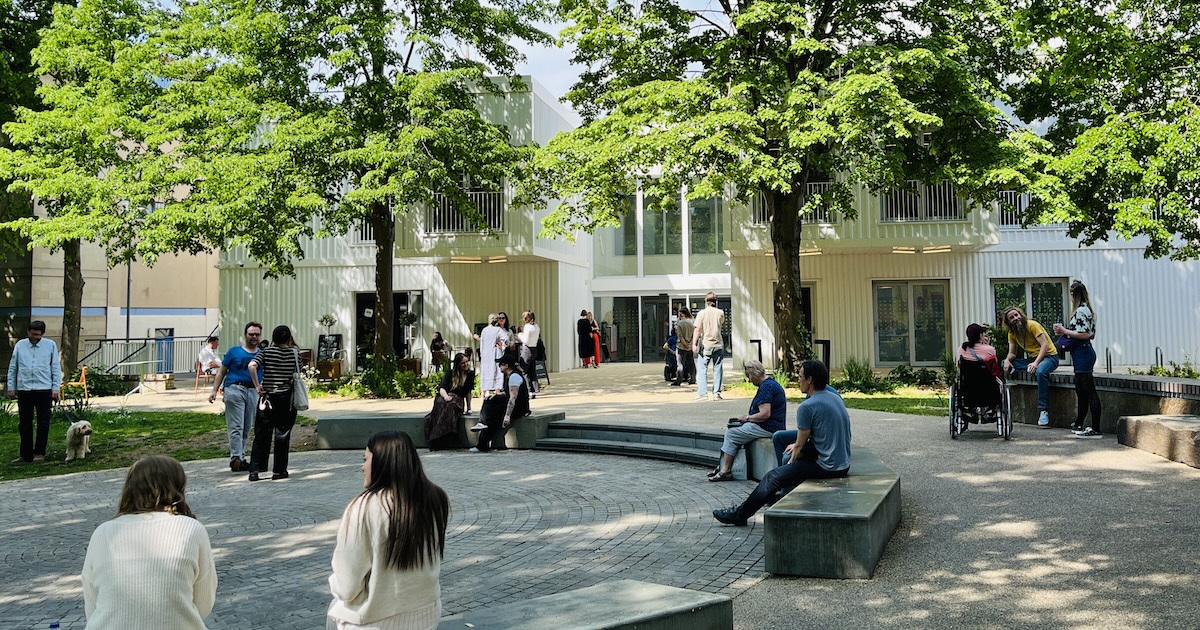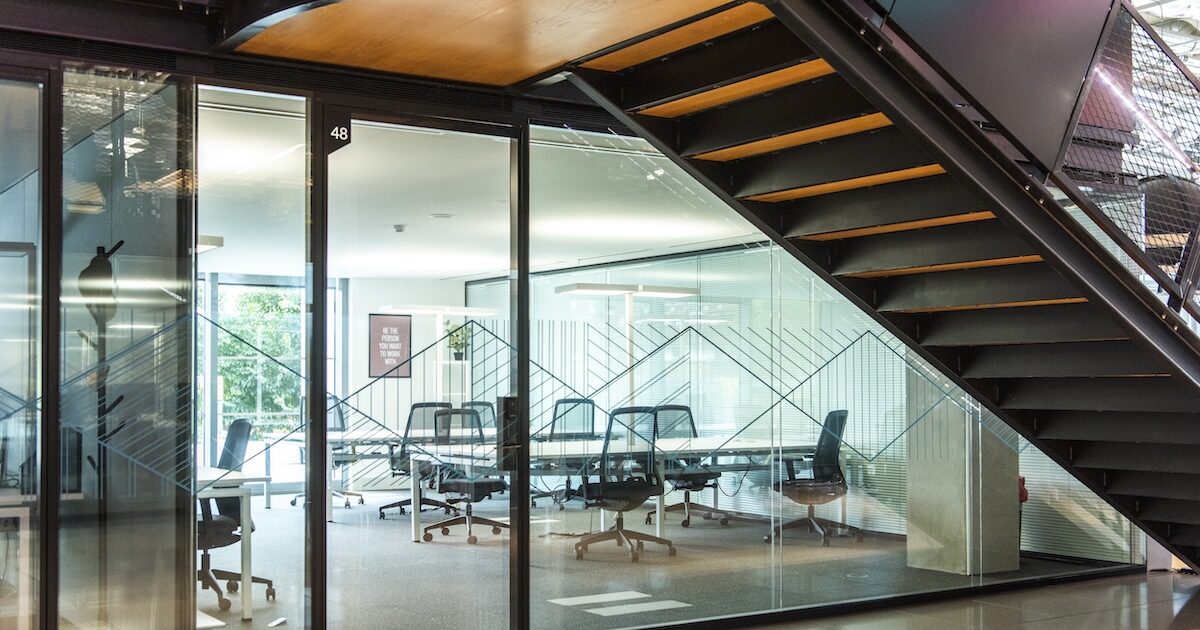Plexal has been delivering the East London Inclusive Enterprise Zone (ELIEZ) alongside 13 partners, including University College London and our member Disability Rights UK. And we’re excited to celebrate the graduation of the 30 members who took part in our six-month accelerator.
As well as optimising our physical workspace for accessibility, Plexal provided mentoring, workshops and tailored support to help ELIEZ members grow their startups. And we’d like to spotlight some of the innovators who have just graduated. If you’d like to collaborate with any of them, get in touch and we’ll connect you.
EmPact: preparing underrepresented groups for the workplace
Co-founders Liz Bastin and Stella Ezeogu previously worked for Big Four consultancy firms. But it was the employment barriers they had to break down as Black, dyslexic women that inspired the co-founders to form EmPact: a diversity and inclusion consultancy.
Liz and Stella joined ELIEZ so that they could work in an environment that’s dedicated to supporting entrepreneurs with a disability or startups that are making life more accessible for disabled people. “Being on ELIEZ has enabled us to validate and redefine our USP, which has been pivotal in maximising out impact,” they said.
Empact connects Black and Black neurodivergent talent, as well as young people with either seen or unseen disabilities, with roles at progressive firms. It aims to help 5,000 people from these groups get a job they love by 2022.
The Ability People: closing the disability employment gap
Steve Carter, co-founder of The Ability People, is a recruitment expert with over 30 years’ experience across the UK and Australasia. So when he met former Paralympian and co-founder Liz Johnson, the pair fused together a knowledge of recruitment and a passion for changing the way that disabled people are represented and included in society.
The business works with disabled consultants to advise recruiters on how they can be more inclusive. And ELIEZ has helped the co-founders secure Series-A funding and improve their growth strategy. They said: “As an early-stage business we had little experience of fundraising, and the support from ELIEZ helped us shape our proposition and presentation to the point we received a funding offer before the programme was completed”.
In 2021, Steve and Liz intend to build their own tech platform and they’ll also be working with marketing specialist and fellow ELIEZ member Dom Hyams to help boost their social media presence.
Tiny Man Digital: helping companies fulfil their digital ambitions
ELIEZ is the third Plexal accelerator Dom Hyams has been through: he took part in our London RoadLab mobility accelerator as well as OpenDoor, our inclusion programme, while he was the communications director at Grid Smarter Cities.
He joined ELIEZ to scale the digital marketing and design agency he founded during the pandemic, Tiny Man Digital. When Dom was furloughed, he began taking on freelancing and pro-bono charity work, which made him realise businesses needed assistance with their online presence more than ever.
Tiny Man Digital works with disability-led clients and others, specialising in rebranding, social media strategy, marketing campaigns and website development. Dom was born with a severe form of brittle bone disease and believes he has a “natural affinity” with disability-led organisations.
And 2021 is going to be a year of growth for Dom and his team, with some big clients and partnerships on the horizon.
Lapapo: supporting the families of disabled children
Anike Mlemchukwu worked with disabled children for 12 years before realising that something more needed to be done to support their families too. Lapapo launched in 2019 and is on a mission to make life easier for parents by providing an intuitive and accessible ecommerce store that specialises in products for disabled children.
The bespoke support and opportunity to work with like-minded innovators is what drew Anike to ELIEZ. She said: “It’s been a privilege to have a workspace at Plexal and attend workshops with like-minded people in the industry. One of the major benefits of being part of ELIEZ was getting a mentor. He is an expert in marketing and challenged me to re-evaluate the preconceptions about Lapapo through market research”.
This year, Anike is developing a sustainable pricing strategy and creating a brand voice with the help of her mentor.
More Human: bringing communities together and making events accessible
Co-founders Emma Lawton, Mel Nurse and Duncan Lindsey started More Human to empower community leaders to help people feel less lonely and help them make their events more accessible. Emma brings her personal experience to the table: being diagnosed with Parkinson’s has made her realise the importance of going to events but also made her see how a lot of them weren’t as inclusive as they should be.
Emma believes ELIEZ has helped More Human focus its long-term strategy on disability inclusion. She said: “ELIEZ has helped us make crucial connections with potential partners and customers, and keep accessibility front of mind. Having a space to call our own and being part of a cohort has given us a lot of confidence as a young business”.
The co-founders begin a fundraising campaign this year and will focus on populating More Human’s marketplace with ready-to-run events and templates that save the user even more time.
GiveVision: developing vision aids to transform the lives of people with severe sight impairments
Elodie Drapieri, Stan Karpenko and Piotr Imielski created GiveVision to help people with sight loss regain their sight and enhance people’s vision with the help of low-vision aids. GiveVision’s SightPlus product is a clinically validated medical device that helps restore vision and reinstate untreatable sight loss through VR.
Although the team have been through previous accelerator programmes, ELIEZ is the first programme that was able to offer a dedicated community of disability-led innovators.
GiveVision has more products in development and is looking to secure partnerships like its collaboration with Sony, which it secured in March 2020.
[R E S E T]: developing adaptive clothing to aid mobility for people with Parkinson’s
Monika Dugar has a bachelor’s degree in Fashion Development and Design from the London College of Fashion (LCF) and is the co-founder of [R E S E T] alongside her sister Usha Baid.
The sisters took inspiration from their father’s Parkinson’s diagnosis and set out to develop adaptive clothing that can help people with Parkinson’s get dressed easier and move more comfortably. The collection provides freedom and mobility (with multiple pockets and customised Velcro), and also helps to dampen any visual or censorial problems that the customer may have by integrating specialised print into its designs (following the theory of Visual Control of Locomotion).
The concept for [R E S E T] developed during LCF’s Collaborative Challenge course, which partnered with the ELIEZ network to task postgraduate students with developing an adaptive fashion item. And ELIEZ helped turn the University project into a business by providing industry expertise on areas such as product design, pitching and branding.
[R E S E T] plans to expand into the global market and is looking for first-round funding opportunities in 2021. The startup has already been featured in The Guardian, Dezeen magazine and Parkinson’s Life.
Mumbli: helping people to experience sound without stress
CEO and founder Marion Marincat lost 80% of his hearing at the age of 26. And it’s his experience of using hearing devices at events and public gatherings that made him realise social spaces were not geared up for people with a hearing impairment.
So in 2018 he launched Mumbli: a hearing health and wellness platform that helps people find venues with suitable soundproofing. Marion’s technology is able to monitor and report on a location’s sound health, and then match appropriate venues to people after they’ve completed a hearing personality test.
Being part of ELIEZ has helped Marion engage with venues around east London and Here East. He’s looking to continue developing these partnerships and help more venues design inclusive social spaces.
Chat-e-Cycle: a community tandem cycling scheme for older adults
Chat-e-Cycle (winner of the RSA Student Design Awards) is a rural community project that encourages local residents to ride together on an electric tandem bicycle. Older people who don’t live near public transport and can’t drive often end up being isolated – and that’s the challenge Kate Mattick aims to tackle.
Kate’s vision started as a project and crowdfunding campaign as part of her master’s degree in Disability, Design and Innovation. ELIEZ helped Kate produce a roadmap for her idea and consolidate her plan to turn the project into a business.
Kate is now looking for networking opportunities and financial guidance as she explores funding routes.


